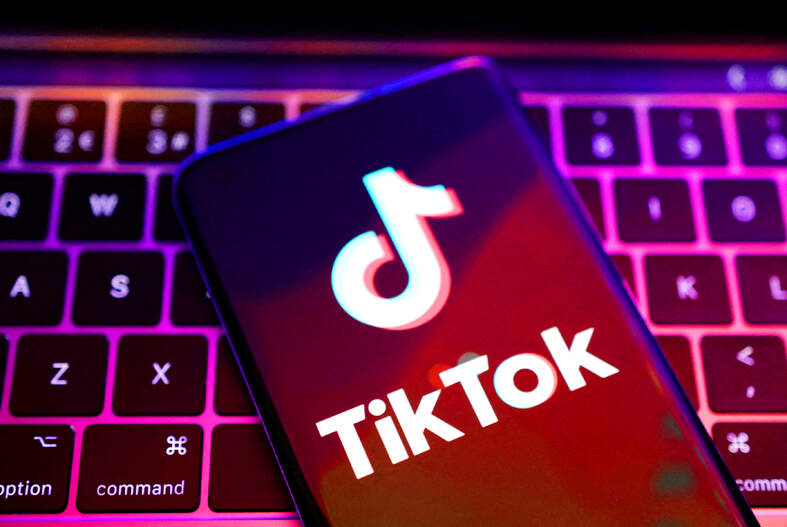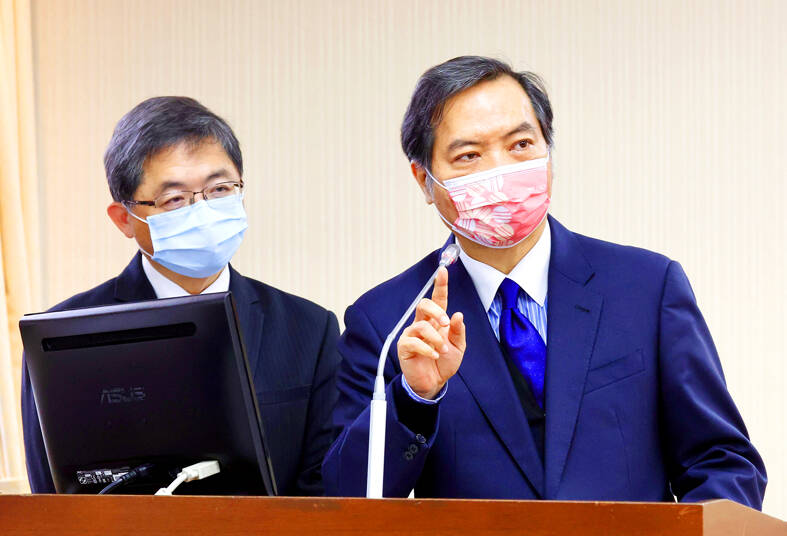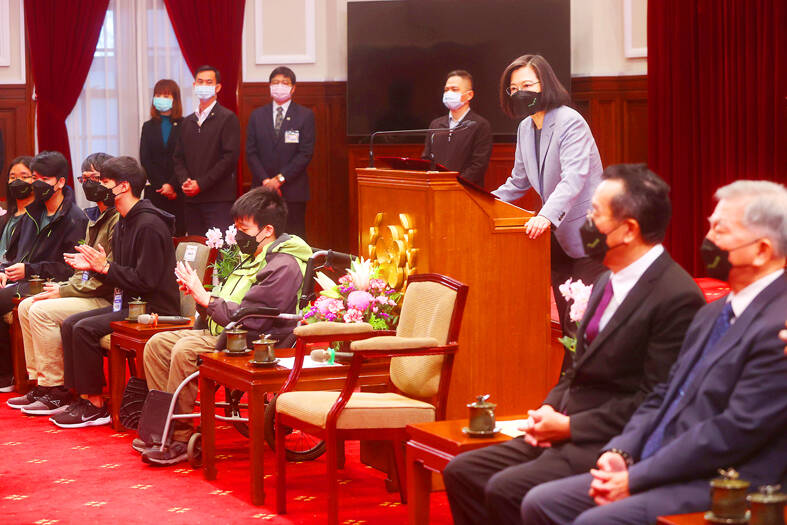Government employees could face punishment if they use TikTok and other Chinese streaming services that have the potential to compromise the nation’s cybersecurity systems, Executive Yuan officials said yesterday.
Although the Ministry of Digital Affairs last week announced that government workers may not download TikTok (or Douyin in Chinese), Xiaohongshu (小紅書) or other Chinese applications that could compromise cybersecurity, so far, only the Executive Yuan and its agencies have implemented the rule, Democratic Progressive Party (DPP) Legislator Loh Meei-ling (羅美玲) said at a meeting of the legislature’s Internal Administration Committee.
Government employees in the Legislative Yuan, the Judicial Yuan, the Control Yuan and the Examination Yuan can still access TikTok, she said, asking if the country had two different standards.

Photo: Reuters
Nor is there a list of software that government employees are prohibited to download to smartphones entrusted to them for government affairs, she said, adding that their smartphones are only subject to inspection twice a year.
Executive Yuan Secretary-General Li Meng-yen (李孟諺) said the Cabinet would coordinate with the four other government branches to uniformly ban the use of TikTok and other cybersecurity-compromising streaming platforms.
Minister Without Portfolio and Executive Yuan spokesman Lo Ping-cheng (羅秉成) said that government employees would be punished in accordance with the regulations if they contravene the TikTok ban.

Photo: CNA
“The punishment might not be enough to deter government workers from using TikTok, so we might need more effective solutions, such as preventing access to such software in public areas. These would be the types of issues that an ad-hoc task force of the Executive Yuan will address,” Lo said.
However, more public discussion is needed to determine whether Taiwan should draft laws to completely ban the use of TikTok across the nation, as India and other countries have done, Lo said.
Li said that the government has the responsibility to ensure that government agencies are free from the influence of Chinese apps.

Photo: CNA
“However, if the TikTok ban were to be extended from government employees to civilians, freedom of speech — which the government is obligated to protect — would be an issue,” he said.
Separately, President Tsai Ing-wen (蔡英文) said the government would reinforce the national cybersecurity infrastructure and enhance citizens’ ability to identify misinformation and disinformation to fight cognitive warfare launched by foreign forces.
Tsai made the remarks at the Presidential Office during a meeting with a group of students from the Kaohsiung Municipal Senior High School who won the top prize at this year’s Cybersecurity Golden Shield Awards.
“My administration has always believed that cybersecurity issues are national security issues. With the rapid development of new technologies, our cybersecurity system is facing increasing threats and frequent attacks. Foreign forces are launching cognitive warfare by disseminating misinformation and disinformation to confuse the public,” Tsai said.
“All these tactics could potentially do great harm to our democratic system. As such, we are enhancing citizens’ ability to identify misinformation and disinformation and reinforce the national cybersecurity infrastructure,” she added.
The Cyber Security Management Act (資通安全管理法), which the legislature passed in 2018, requires government agencies and key infrastructure operators to establish cybersecurity protection mechanisms.
“The Administration for Cybersecurity at the Ministry of Digital Affairs, which was founded in August, handles national cybersecurity issues, conducts cybersecurity protection drills and trains cybersecurity workers,” Tsai said. “We will also work with our democratic allies to build a more resilient and safer supply chain, and enforce measures to protect intellectual property rights.”

Seventy percent of middle and elementary schools now conduct English classes entirely in English, the Ministry of Education said, as it encourages schools nationwide to adopt this practice Minister of Education (MOE) Cheng Ying-yao (鄭英耀) is scheduled to present a report on the government’s bilingual education policy to the Legislative Yuan’s Education and Culture Committee today. The report would outline strategies aimed at expanding access to education, reducing regional disparities and improving talent cultivation. Implementation of bilingual education policies has varied across local governments, occasionally drawing public criticism. For example, some schools have required teachers of non-English subjects to pass English proficiency

‘FORM OF PROTEST’: The German Institute Taipei said it was ‘shocked’ to see Nazi symbolism used in connection with political aims as it condemned the incident Sung Chien-liang (宋建樑), who led efforts to recall Democratic Progressive Party (DPP) Legislator Lee Kun-cheng (李坤城), was released on bail of NT$80,000 yesterday amid an outcry over a Nazi armband he wore to questioning the night before. Sung arrived at the New Taipei City District Prosecutors’ Office for questioning in a recall petition forgery case on Tuesday night wearing a red armband bearing a swastika, carrying a copy of Adolf Hitler’s Mein Kampf and giving a Nazi salute. Sung left the building at 1:15am without the armband and apparently covering the book with a coat. This is a serious international scandal and Chinese

TRADE: The premier pledged safeguards on ‘Made in Taiwan’ labeling, anti-dumping measures and stricter export controls to strengthen its position in trade talks Products labeled “made in Taiwan” must be genuinely made in Taiwan, Premier Cho Jung-tai (卓榮泰) said yesterday, vowing to enforce strict safeguards against “origin laundering” and initiate anti-dumping investigations to prevent China dumping its products in Taiwan. Cho made the remarks in a discussion session with representatives from industries in Kaohsiung. In response to the US government’s recent announcement of “reciprocal” tariffs on its trading partners, President William Lai (賴清德) and Cho last week began a series of consultations with industry leaders nationwide to gather feedback and address concerns. Taiwanese and US officials held a videoconference on Friday evening to discuss the

PERSONAL DATA: The implicated KMT members allegedly compiled their petitions by copying names from party lists without the consent of the people concerned Judicial authorities searched six locations yesterday and questioned six people, including one elderly Chinese Nationalist Party (KMT) member and five KMT Youth League associates, about alleged signature forgery and fraud relating to their recall efforts against two Democratic Progressive Party (DPP) legislators. After launching a probe into alleged signature forgery and related fraud in the KMT’s recall effort, prosecutors received a number of complaints, including about one petition that had 1,748 signatures of voters whose family members said they had already passed away, and also voters who said they did not approve the use of their name, Taipei Deputy Chief Prosecutor